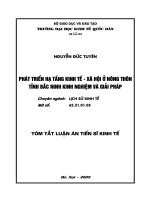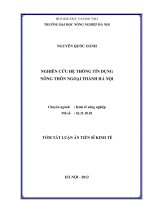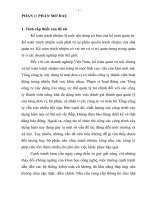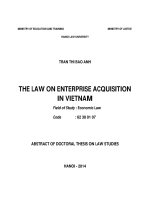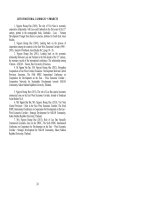tóm tắt luận án isolation and screening of aspergillus niger biosynthesize high activity pectin methylesterase
Bạn đang xem bản rút gọn của tài liệu. Xem và tải ngay bản đầy đủ của tài liệu tại đây (114.73 KB, 3 trang )
MINISTRY OF EDUCATION & TRAINING
CAN THO UNIVERSITY
TRAN THANH TRUC
ISOLATION AND SCREENING OF
ASPERGILLUS NIGER BIOSYNTHESIZE
HIGH ACTIVITY PECTIN METHYLESTERASE
DISSERTATION OF DOCTORAL DEGREE IN BIOLOGY
Specialization: Microbiology
Field of Study Code: 62 42 01 07
Supervisors
Assoc. Prof. Dr. NGUYEN VAN MUOI
Dr. NGUYEN VAN THANH
Can Tho, 2013
SUMMARY
The thesis “Isolation and screening of Aspergillus niger biosynthesize high
activity pectin methylesterase” was performed in the laboratory of Food
Technology Department, College of Agriculture and Applied Biology, Can
Tho University and other laboratories, from 11.2008 to 9.2012.
The thesis was conducted to investigate the biosynthesis process and
application of pectin methylesterase (PME, EC 3.1.1.11) in solid state
fermentation (SSF) of isolated and selected Aspergillus niger from the
practical conditions of Vietnam.
Sixty species which have morphologically similar Aspergillus niger were
isolated from the peels of rich pectin fruits which have been found to be
widely in Mekong delta, such as orange, pomelo, citrus, apple and fig peels
on Potato dextrose agar (PDA), Czapek Dox Agar (CZ) and Malt Extract Agar
(MEA). To indicate the pectinase activity of the organisms, diameters of clear
zone around colonies on pectin agar medium were measured. The result
showed that all of sixty isolates have the ability of pectinolytic activities, in
which 14 out of the 60 isolates were able to produce a higher pectinase
activity, based on the average clear zone diameter were larger than 20 mm.
Further screening of PME production of the 14 selected isolates, the maximum
PME production was obtained by 4 isolates (T
1
, N
1
, So
2
and R
1
) which were
isolated from the peels of Ziziphus mauritiana (“Tao ta”), Citrus
lemon (“chanh num”), Citrus sinensis L. (“cam soan”) and Citrus
maxima (“Nam Roi” pomelo), respectively. The combination of two isolates
of R
1
and So
2
with the proportion of 1:1, was conducted to investigate the
suitable conditions for PME biosynthesis by solid state fermentation.
In addition, the identification by sequencing of 28S rRNA gene, revealed that
4 selected isolates T
1
, N
1
, So
2
and R
1
had 99 ÷ 100% identity to Aspergillus
niger.
The optimal conditions of pectin methylesterase biosynthesis from
Aspergillus niger So
2
and R
1
in solid-state fermentation were evaluated, based
on the individual factors (substrate characteristics, nutrients, buffer solutions
and incubation time) which influenced to PME production were investigated.
After that, the Response surface methodology (RSM) based on four-variable
central composite design (CCD) can be used to model the correlation of the
fermentation conditions such as inducer concentration, initial pH, incubation
temperature & moisture content of medium to PME activity. Moreover, some
extraction parameters, consist of type of solvent, pH, ratio of solvent and
fermented solids were studied. In addition, the best combination of extraction
temperature, contact time was also determined.
Especially, the use of rich pectin of agricultural material in Mekong
Delta (mixture of apple pomace and pomelo peels at the ratio of 1:1 w/w) as a
fermentation medium was taken into consideration for the PME production
of A. niger in this investigation. With the addition of 0.1% urea combined
with 0.5% MgCl
2
and 0.15% CaCl
2
into fermentation media, the
highest PME obtained after 96 hours incubation at a temperature of 35.5°C
and pH 4.0 (adjusted by citrate buffer), fermentation temperature and moisture
content adjusted to 57.4% and 16.5% v/w of inducer concentration (10
5
cfu/mL). In addition, citrate buffer (pH 3.6) at 35°C and 50 min provided the
best recovery in order to obtain highest value of PME. The ratio
2:1 (v/w) of solvent and substrate was determined as an optimal condition for
concentrated enzyme extracts. Maximum production of PME (about 79.1 U/g
of substrate) was recorded under optimum conditions of SSF and extraction.
Ethanol was the appropriate precipitant for PME purification with the optimal
ratio of cold ethanol and crude enzyme 3 : 1 (v/v). In this case, specific
activity of PME was 10.02 U/mg
protein
, the purification factor achieved 7.98
fold and the PME recovery yield obtained 91.48%. Combined with the cross
flow membrane step, the specific activity of PME reached to 15.63
U/mg
protein
and the purification factor achieved 12.40 ± 0.89 fold in
comparison to the crude enzyme solution. The molecular weight of the
enzyme was found to be 43 kDa and K
m
was 0.6014 mg/mL. The activity of
the enzyme was stimulated by NaCl or CaCl
2
. In addition, the optimum
temperature and pH of A. niger PME were 38 ÷ 40°C and 5.0, respectively.
Isothermal inactivation of partial purified A. niger PME could be described by
a fractional – conversion model and the inactivation rate constants increase
with increasing temperatures from 50 to 70°C.
The obtained technical PME enzyme also proved the positive effects to
improving of the texture of frozen pineapples and fermented cucumbers.
Key words: Aspergillus niger, isolation, high activity, pectin methylesterase,
rich pectin substrate, screening, solid state fermentation, texture
improvement.


